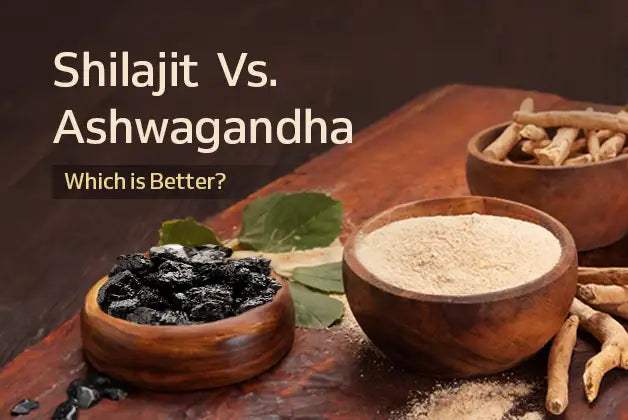
Shilajit vs. Ashwagandha: Which is Better?
Share
Ayurveda, which is the ancient Indian system of medicine, boasts in its remedies a treasure trove of potent herbs. Two such gems used in herbal remedies and natural supplements are Shilajit and Ashwagandha which have gained immense popularity in recent times for their potential health benefits. Both of these ingredients have their roots in ancient Ayurvedic medicine and are classified as adaptogens. Adaptogens are generally herbs, roots, or other plant substances that are believed to help the body adapt to stress and promote overall well-being. But with both the ingredients sharing overlapping benefits, a common question arises: Shilajit vs Ashwagandha - which one comes out on top? Let's dive into the details to find out.
Shilajit: The Mineral Pitch

Shilajit is a sticky, tar-like substance and isn't quite a plant. It is a blackish-brown resinous substance that oozes out from the rocks in the Himalayas during the hot summer months. Formed over millennia from the gradual decomposition of plants and minerals within the mighty Himalayas, it's a complex entity rich in fulvic acid, humic acid, and over 80 minerals. This unique composition of Shilajit makes it a potent source of nutrients and antioxidants.
Understanding the Primary Health Benefits of Shilajit
- Energy Booster: Shilajit is renowned as a natural energizer. It's believed to improve the absorption of nutrients at the cellular level which can lead to increased energy production. Shilajit can also be a valuable tool for those seeking to combat sluggishness and elevate their vitality as it enhances physical performance and reduces fatigue.
- Stress Management Powerhouse: While not as extensively studied for stress reduction as Ashwagandha, Shilajit's adaptogenic properties may help regulate stress hormones which promotes a sense of calm and well-being. Early research suggests it may play a role in mitigating the negative effects of stress on the body.
- Cognitive Enhancement Potential: Some studies indicate Shilajit's potential to improve cognitive function. It's believed to work by increasing blood flow to the brain, which may enhance focus, memory, and overall cognitive performance. Additionally, it might possess neuroprotective properties which can potentially safeguard brain cells from damage. Shilajit may help protect against cellular damage and premature aging due to its antioxidant content.
- Potential Benefits for Men's Health: Shilajit has been linked to increased testosterone levels which can benefit both men and women in various ways. Some studies suggest Shilajit may improve testosterone levels and sperm quality which contributes to overall reproductive health in men. While further research is needed, this potential benefit holds promise for those seeking natural solutions in this area.
Ashwagandha: The “Indian Ginseng”

Ashwagandha is also known as Withania somnifera which is a small shrub native to India and North Africa. Ashwagandha is a flowering shrub and is a well-researched adaptogen with a long history of medicinal use in Ayurveda. Its roots and leaves are the primary medicinal parts which are revered for their diverse health benefits. Its roots and leaves have been used for centuries in Ayurvedic medicine to promote vitality, reduce stress, and enhance overall well-being.
Understanding the Primary Health Benefits of Ashwagandha
- Natural Stress Buster: Ashwagandha is widely celebrated for its stress-relieving properties. Studies suggest it helps regulate cortisol, the primary stress hormone thereby leading to improved mood, reduced anxiety, and better sleep. Ashwagandha can contribute to a more balanced and resilient state of being by mitigating the negative effects of stress on the body and mind.
- Immunity Ally: Ashwagandha is believed to possess immunomodulatory properties which means it may help modulate the immune system. This potential benefit translates to potentially boosting the body's defense mechanisms in fighting off infections and diseases. Ashwagandha can contribute to overall well-being by supporting a healthy immune system.
- Boosts Libido and Fertility: Both in men and women, Ashwagandha may improve sexual health by enhancing libido, and sperm quality, and regulating menstrual cycles. Studies suggest it can address hormonal imbalances that might be affecting sexual health and fertility.
- Supports Cognitive Function: Similar to Shilajit, Ashwagandha is being explored for its potential benefits in improving memory, focus, and cognitive function in aging individuals. Early research suggests it may positively impact cognitive performance, making it a promising option for those seeking natural ways to support brain health.
The Great Debate of Choosing Between Shilajit and Ashwagandha

So, which herb takes the crown in the battle of Shilajit vs Ashwagandha? The truth is, there's no single winner. Both Shilajit and Ashwagandha offer a distinct spectrum of benefits which makes them valuable tools in your wellness health kit.
Here's a breakdown to help you decide which herb might be a better fit for your specific needs:
You May Choose Shilajit if:
- You prioritize increased energy and vitality and are looking for a natural remedy to combat fatigue.
- You're interested in exploring potential cognitive benefits and supporting brain health.
- You want natural support for men's health and are seeking solutions to improve reproductive health.
You May Choose Ashwagandha if:
- You struggle with chronic stress, anxiety, and sleep disturbances.
- You desire to boost your immune system and support your body's natural defenses.
- You aim to enhance sexual health and fertility in a
The Power of Combining Shilajit and Ashwagandha

Here's the exciting part that can subside your curiosity about knowing which herb is better. Shilajit and Ashwagandha can be a powerful team together! Yes, while both Shilajit and Ashwagandha offer impressive health benefits on their own, their combined effects can be even more potent. Shilajit and Ashwagandha work synergistically to enhance each other's benefits and provide comprehensive support for overall health and well-being when both are taken together.
